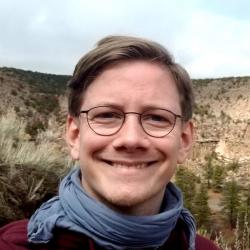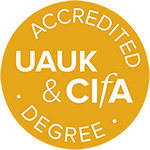Biography
After studying Prehistoric Archaeology and Biology at the Universities of Marburg and Tübingen (Germany), I obtained my doctorate in Archaeological Sciences from the University of Tübingen in 2018. The following year I joined the School of Archaeology at the University of Oxford as a Marie Skłodowska-Curie Fellow. Until my appointment at Cambridge in January 2024, I continued my postdoctoral research at Oxford on a Leverhulme Trust Early Career Fellowship.
Research
My research focuses on various aspects of human-environment interactions, plant-based subsistence strategies and domestication. Besides archaeobotanical research on prehistoric sites in southwest Asia and Europe (mostly Neolithic, Bronze, and Iron Age) I employ plant functional ecology to better understand past agro-ecological processes and their link to human subsistence practices and socio-economic dynamics. I also have a strong interest in archaeological and ecological theory related to domestication studies and non-human agency.
Key Publications
2025
Weide, A., Trixl, S., Nelle, O., Märkle, T., Hald, J., Ebersbach, R., Marinova, E. Middle Neolithic subsistence strategies in southwest Germany: the site Reichenau-B33 at Lake Constance in regional context. Environmental Archaeology
2023
Weide, A., Hodgson, J.G., Whitlam, J. et al. Reply to: Can a functional ecological model reliably reveal the nature of early plant management in southwest Asia? Nature Plants 9, 1964–1967
2022
Weide, A., Green, L., Hodgson, J.G., Douché, C., Tengberg, M., Whitlam, J., Dovrat, G., Osem, Y., Bogaard, A. A new functional ecological model reveals the nature of early plant management in southwest Asia. Nature Plants 8, 623–634
2021
Weide, A. Towards a Socio-Economic Model for Southwest Asian Cereal Domestication, Agronomy 11:2432
Weide, A., Hodgson, J.G., Leschner, H., Dovrat, G., Whitlam, J., Manela, N., Melamed, Y., Osem, Y., Bogaard, A. The association of arable weeds with modern wild cereal habitats: implications for reconstructing the origins of plant cultivation in the Levant. Environmental Archaeology, 1-16
Weide, A., Arranz-Otaegui, A., Schmidt, A.F., Kim, H., Charles, M., Zeidi, M., Darabi, H., Richter, T., Conard, N.J. Identification of the Triticoid type grains from archaeobotanical assemblages in southwest Asia as Heteranthelium piliferum (Banks & Sol.) Hochst. (Poaceae). Vegetation History and Archaeobotany 30, 657–674
Bogaard, A., Allaby, R., Arbuckle, B.S., Bendrey, R., Crowley, S. Cucchi, T., Denham, T., Frantz, L., Fuller, D., Gilbert, T., Karlsson, E., Manin, A., Marshall, F., Mueller, N., Peters, J., Stépanoff, C., Weide, A., Larson, G. Reconsidering domestication from a process archaeology perspective, World Archaeology 53, 56–77
2018
Weide, A., Riehl, S., Zeidi, M., Conard, N.J., A systematic review of wild grass exploitation in relation to emerging cereal cultivation throughout the Epipalaeolithic and aceramic Neolithic of the Fertile Crescent. PLoS ONE 13(1): e0189811
2017
Weide, A., Riehl, S., Zeidi, M., Conard, N.J., Reconstructing subsistence practices: taphonomic constraints and the interpretation of wild plant remains at aceramic Neolithic Chogha Golan, Iran. Vegetation History and Archaeobotany 26, 487–504
2015
Weide, A., Riehl, S., Zeidi, M., Conard, N.J., Using new morphological criteria to identify domesticated emmer wheat at the aceramic Neolithic site of Chogha Golan (Iran). Journal of Archaeological Science 57, 109–118
Weide, A., On the Identification of Domesticated Emmer Wheat, Triticum turgidum subsp. dicoccum (Poaceae), in the Aceramic Neolithic of the Fertile Crescent. Archäologische Informationen 38, 381–42
2023
Hodgson, J., et al. A Functional Trait Database of Arable Weeds from Eurasia and North Africa. University of Oxford.
Whitlam, J., Weide, A. Introduction to the special issue on ‘Plant use and management during the emergence of farming in Southwest Asia: recent insights and new approaches’. Vegetation History and Archaeobotany 32, 431–434
2020
Hald, J., Marinova, E., Weide, A., Seeblick garantiert: Eine Ackerbausiedlung am westlichen Bodensee aus dem 5. Jahrtausend v.Chr. (“A farmer’s village from the 5th millenium BCE”). Denkmalpflege in Baden-Württemberg 4, 241–244
Müller-Karpe, A., Müller-Karpe, V., Süssenguth, R., Weide, A., Untersuchungen in Kayalıpınar 2019 (“Excavations at Kayalıpınar 2019“). Mitteilungen der Deutschen Orientgesellschaft 152, 191-236
2014
Weide, A., Die ältere Hallstattzeit im „Marburger Raum“ – Bericht über Keramikfunde aus einem Grubenkomplex bei Weimar-Niederweimar, Kr. Marburg-Biedenkopf, und ihre regionale sowie überregionale Einordnung (“The early Hallstatt period around Marburg – Reporting a ceramic assemblage from Weimar-Niederweimar and its superregional significance”). Fundberichte aus Hessen 51/52, 105–152
Teaching and Supervisions
I coordinate the modules Introduction to Archaeological Science (A21) and Archaeobotany (AS6) and contribute to various other courses, including Archaeology in Action (A2), Archaeological Theory and Practice I (A10) and The Past in the Present (A13).
I am open to supervise postgraduate students who are interested in questions around past plant use, agriculture, palaeoecology and methodological aspects of plant macro-remain analysis.
Other Professional Activities
Founding member of the Research Group Early Plant Management and Domestication in Southwest Asia (a subgroup of the IWGP – International Work Group on Palaeoethnobotany)
Co-editor of special issues on topics including early plant management, domestication, and biodiversity in the journals Vegetation History and Archaeobotany and Archaeometry.



